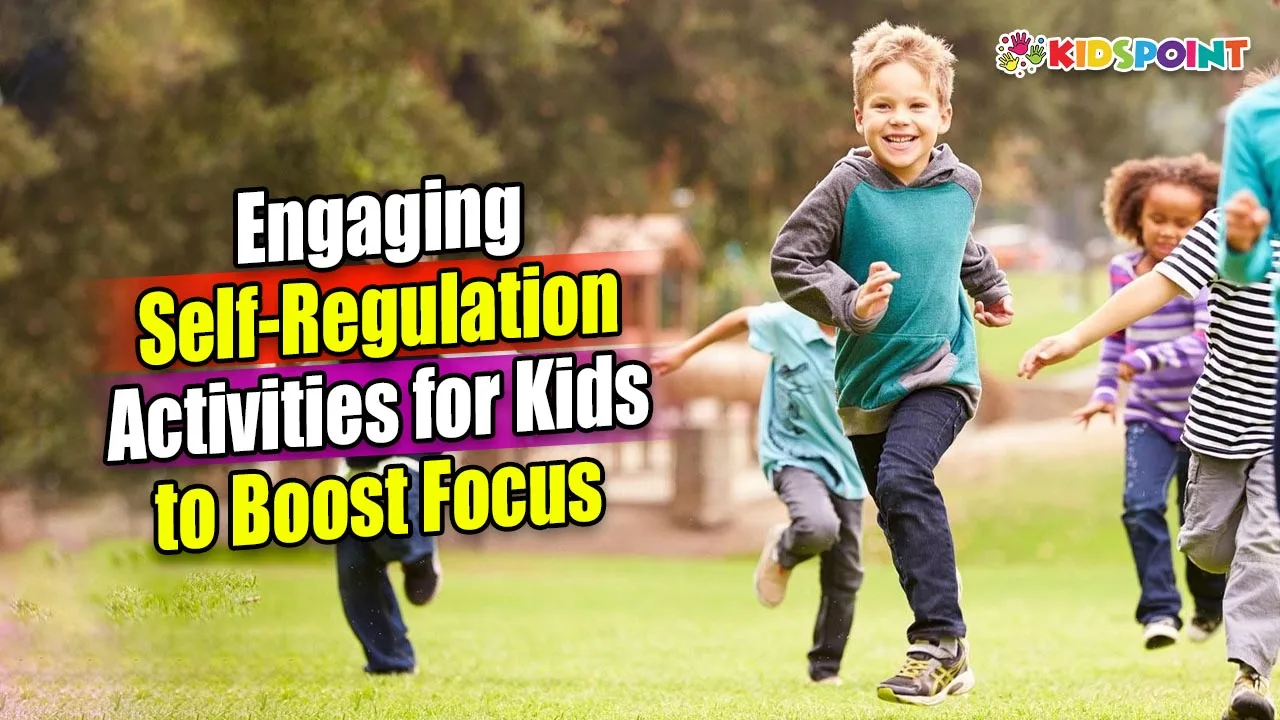Self-regulation is a foundational skill that supports children’s overall development, helping them manage their emotions, thoughts, and behaviors effectively. Whether it’s staying on task, handling frustration, or maintaining attention during learning activities, developing self-regulation is essential for success in school and beyond. At The Kids Point, we believe in nurturing these critical skills through engaging and meaningful activities that resonate with kids of all ages.
In this article, we’ll explore a variety of self-regulation activities that can enhance kids’ focus, build emotional resilience, and encourage positive behavior. These activities are designed to be fun, easy to implement, and adaptable for different age groups.
What is Self-Regulation?
Self-regulation is the ability to monitor and manage one’s emotions, thoughts, and actions in different situations. It encompasses skills such as impulse control, emotional regulation, and goal-oriented behavior. Strengthening self-regulation helps children stay focused, calm under pressure, and better equipped to tackle challenges.
Benefits of Self-Regulation for Kids
- Enhanced Focus: Improves the ability to pay attention and complete tasks without distractions.
- Better Emotional Management: Helps kids cope with frustration, anxiety, or excitement in constructive ways.
- Improved Social Skills: Encourages positive interactions with peers and adults.
- Academic Success: Aids in mastering challenging subjects by promoting perseverance.
Engaging Self-Regulation Activities for Kids
Mindful Breathing Techniques
Mindfulness encourages kids to focus on the present moment, helping them develop a sense of calm.
- Belly Breathing: Have kids place a small stuffed animal on their stomachs. Encourage them to breathe in deeply and slowly, watching the stuffed animal rise and fall.
- Bubble Breathing: Ask kids to pretend they’re blowing bubbles, taking slow, deep breaths to “inflate” imaginary bubbles without popping them.
Focus Games
Games can turn practicing self-regulation into an enjoyable activity:
- Simon Says: This classic game requires kids to listen carefully and control their impulses to follow only the right commands.
- Red Light, Green Light: Encourages kids to pause and respond at the right moments, building focus and impulse control.
Yoga for Kids
Yoga promotes physical and mental control through stretching and breathing. Simple poses like tree pose or downward dog encourage body awareness and concentration. Pair yoga with fun narratives, like pretending to be animals, to engage younger children.
Emotion Charades
Write different emotions (e.g., happy, angry, excited) on cards and have kids act them out while others guess. This activity helps children recognize and regulate their emotions.
Coloring Mandalas
Intricate patterns require sustained focus and calmness, making mandala coloring an excellent activity to promote mindfulness. Offer a variety of designs tailored to different age groups.
Self-Control Challenges
- The Marshmallow Test: Place a marshmallow or treat in front of kids, telling them they’ll get a second one if they wait five minutes before eating it.
- Paper Airplane Countdown: Let kids craft paper airplanes but encourage them to wait for a specific countdown before launching them.
Nature Walks and Brain Breaks
Outdoor activities allow children to reset their focus while experiencing sensory input.
- Forest Explorations: Encourage kids to note the sounds, textures, and sights around them.
- Butterfly Breathing: Pair deep breathing exercises with arm movements mimicking butterfly wings.
Goal-Setting Activities
Teach children to set and track short-term goals. For example, they could aim to finish a storybook or complete a puzzle over the week. Using visual trackers or rewards systems can make progress more tangible and motivating.
Mirror Games
Have two children face each other, with one leading slow, deliberate movements while the other mirrors them. This requires focus and patience, helping to develop self-regulation.
Role-Playing Scenarios
Introduce real-life situations, such as waiting their turn or resolving conflicts with friends. Ask kids to act out their responses, emphasizing the importance of pausing and thinking before acting.
DIY Sensory Bottles
Create sensory bottles filled with glitter, beads, or colorful water. Shaking the bottle allows children to observe how the glitter settles, promoting a moment of calm reflection.
Freeze Dance
Play music and have children dance around. When the music stops, they must freeze in place. This game strengthens their ability to control their movements.
Journal Writing
Writing or drawing emotions provides children with an outlet to process their thoughts.
- Prompts such as “What do you do when you feel upset?” or “How do you calm down after a tough day?” encourage reflection and learning.
Building Patience with Puzzles
Completing puzzles requires sustained focus and persistence. Provide puzzles of varying complexity based on the child’s age and interest.
Reading Stories with Self-Regulation Themes
Books like A Little Spot of Patience or What If? introduce self-regulation concepts through relatable characters and stories.
How to Support Kids in Developing Self-Regulation
Model the Behavior
Children learn by example. Show them how you use strategies to calm down or stay focused during challenges.
Practice Positive Reinforcement
Praise specific behaviors like waiting patiently, taking deep breaths, or completing a task without getting distracted.
Create a Calm Corner
Set up a calming space with soft lighting, fidget toys, sensory bottles, and calming books to help kids take a break when feeling overwhelmed.
Build Routines
Predictable routines give children a sense of control, helping them regulate their emotions and expectations.
Encouraging Self-Regulation Through Everyday Activities
While structured activities are beneficial, self-regulation can also be integrated into daily routines.
- During Mealtime: Teach gratitude by taking turns sharing what they’re thankful for.
- At Bedtime: Use relaxation techniques like deep breathing to wind down.
- During Playtime: Allow free play to encourage problem-solving and self-expression.
Self-regulation is a skill that can significantly enhance a child’s focus, emotional balance, and ability to navigate challenges. By incorporating these engaging and purposeful activities, you can empower kids to develop their self-regulation abilities while enjoying themselves in the process. At The Kids Point, we’re dedicated to supporting children’s growth and learning through creative and impactful strategies that make every moment count.


